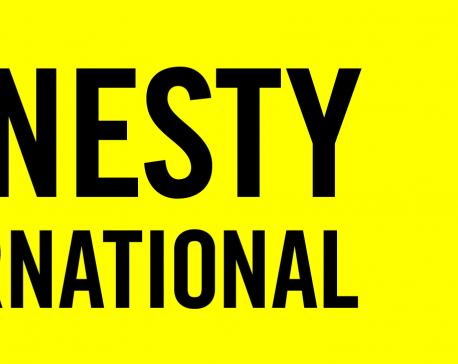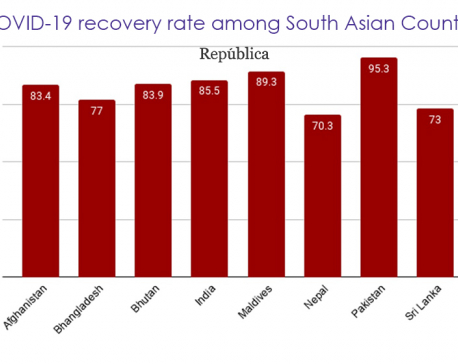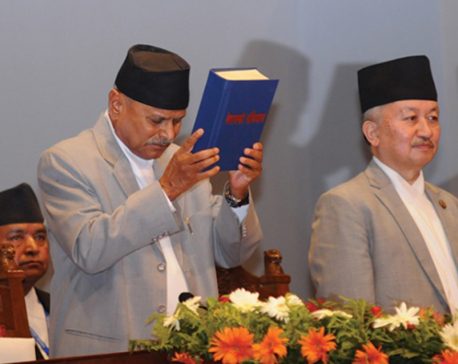
OR
_20200711083507.jpg)
It is timely to state the importance of the Zone of Peace proposal that King Birendra floated to the world during his coronation in 1975. That proposal was meant to ensure that Nepal does not become a victim of an unjust world order.
Just a few days ago Indian Prime Minister Narendra Modi made a very important announcement. Delivering a speech in Laddakh, he 'announced' that the age of expansionism is over. Wow!
Such a declaration, echoing across the South Asian subcontinent and beyond, is no less than music for countries like Nepal, who have been bearing with a virulent strain of expansionism that even sneaks into the corridors of power and easily creeps into the bedrooms of very senior political leaders presiding over apex leadership positions of the country.
So, after this announcement, yours truly just did a cursory check to know whether it had knocked down some of the powerful symbols of expansionism, giving it some time to pass through restrictions arising from massive defense-security build-ups in Laddakh and travel all the way to Nepal through a formidably-manned border.
Despite the powerful declaration, yours truly found that those symbols were still there, standing 'proudly' as ever as a mark of expansionism in our very bosoms.
Yours truly found that the Kalapani-Lipulek-Limpiadhura region was still under foreign occupation with camps and roads further strengthening the stranglehold against a land-linked country by denying it a vital strategic pass as well as an all-weather trade route with the northern neighbor. You know, alternative trade routes are quite important for the very survival of this country, given that usual routes serve a dual purpose of allowing one neighbor to monopolize trade with Nepal and acting as slipknots if it becomes belligerent, yet again.
Despite the declaration, regulatory structures and high-elevation roads robbing Nepal of her water resources were standing as arrogantly as ever.
And micromanagement of our internal affairs was rife as ever, especially after the government move of including the Kalapani-Lipulek-Limpiadhura region into the political map of Nepal and the sovereign parliament's historic act of endorsing it. This meddling was so deep and shameful that the Prime Minister presiding over a very unstable, corruption and misrule-plagued system had to declare that that neighbor (which never gets tired of projecting herself as the world's largest democracy) was trying to topple his popularly-elected government, that meetings were taking place in different hotels for the same.
Apparently, this remark came at a time when retired hawkish generals and wonks were going berserk—they often give an impression (a nerve-wracking one) as if this small country is at war with the hyper-power that seems to be feeling that the world is not enough to accommodate her extraterritorial ambitions—demanding the use of 'assets' in Nepal to topple an elected government over her alleged pro-China tilt.
This war-mongering, this posturing is quite similar to the Laddakh announcement of Narendra Modi. From Laddakh, Modi, chest-thumping or otherwise, was sounding to Beijing that the age of Chinese strain of expansionism was over, given that the sole global superpower and her allies in Australasia were banding together to keep in check the extraterritorial ambitions of the Middle Kingdom.
As for small countries like Nepal, this competition for dominance is not at all welcome. Amid deepening meddling on the part of the dear neighbor and her allies, Chinese involvement in internal affairs of our country has also deepened and this is not an encouraging development. Who knows? Pretty soon, the northern neighbor may also want to micromanage affairs in Nepal, just like the dear neighbor.
This is not what we want.
All this birthplace of the Shakyamuni Buddha, this land of different saints and deities, this spiritual abode of divinities and humanity and this seat of ancient civilization wants is peace with herself and the rest of the world. All it wants is a global order that is just, a world order that enables small countries to hold their heads high, a world order that does not pose perennial existential threats to them.
At this point, it will perhaps be timely to state the importance of the Zone of Peace proposal that King Birendra floated to the world during his coronation in 1975. That proposal, yours truly feels, was meant to ensure that Nepal does not become a victim of an unjust world order and vanish from the world map. By 1990, more than 130 countries had endorsed that proposal, while some of the very prominent countries had refused to do so. Their refusal is quite telling.
Nepal is in a unique position when it comes to deescalating tensions in the neighborhood that may end up destabilizing the whole of Asia, to say the least. We are not only the neighbors of neighborhood giants that are aspiring to become global superpowers in their own rights but we also enjoy cordial relations with the reigning superpower and her allies. Rather than taking sides in this conflict situation, our leaders, as representatives of one of the founding members of the Non-aligned Movement and a country that contributes troops to United Nations peacekeeping missions worldwide, should be able to use their imagination, diplomatic acumen and strive to restore peace in the neighborhood instead of pushing the country into a vortex of what appears to be a global conflict in the making.
At junctures like these, the UN should also grow up and start playing some serious role in de-escalation instead of acting as a lackey of the P5 countries. Forget about adding members to the Security Council. Rather, how about ending this veto-based system (regardless of their size and firepower, all countries are equal in terms of sovereignty, aren't they?) as it seems to be promoting the rise of regional and global goons, and creating a system that is just for smaller, weaker, politically-unstable and climate vulnerable countries?
If it fails to maintain world peace, if it fails to protect the interests of not-so-powerful countries at the expense of some dominant countries to which it seems beholden to, what good will it do to the rest of the world? And who will shed tears if it becomes another League of Nations?
You May Like This

Amnesty Int'l urges govts in South Asia to take urgent action to combat COVID-19 surge
KATHMANDU, May 13: Amnesty International (AI) has urged governments across South Asia to immediately address healthcare shortages and urgently strengthen... Read More...

Nepal has lowest recovery rate and highest active case rate in South Asia
KATHMANDU, Oct 11: Of the eight countries in the South Asian Association for Regional Cooperation (SAARC), Nepal has the lowest... Read More...

Comparing constitutions
Our constitution may not be the best document of the world but it has some provisions which are more progressive... Read More...







Just In
- NRB to provide collateral-free loans to foreign employment seekers
- NEB to publish Grade 12 results next week
- Body handover begins; Relatives remain dissatisfied with insurance, compensation amount
- NC defers its plan to join Koshi govt
- NRB to review microfinance loan interest rate
- 134 dead in floods and landslides since onset of monsoon this year
- Mahakali Irrigation Project sees only 22 percent physical progress in 18 years
- Singapore now holds world's most powerful passport; Nepal stays at 98th












Leave A Comment